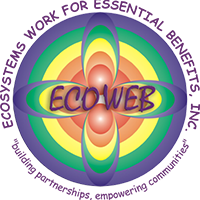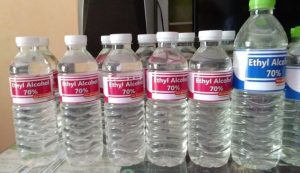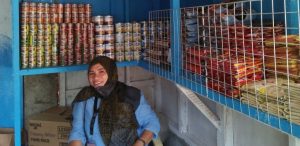How can donors respond to emergencies rapidly, effectively, and with dignity to the survivors? In the Philippines, we are used to seeing food packs containing rice, sardines, noodles, and some other basic commodities.
Yes, we need food. But is that really all that the survivors need?
But assembling those goods, arranging for their transport, and many other preparations take much time.
Though not to be implemented as a stand-alone program, cash assistance is quick and a good response option to the COVID-19 pandemic.
Cash-based programming is one of the eight workstreams that guide the implementation of the Grand Bargain Commitments. Click here to learn about this.
Cash assistance is one of the features of the SURVIVOR AND COMMUNITY LED-RESPONSE (sclr) that EcoWEB advocates and implement in its crisis response programs.
Read EcoWEB’s stories about sclr and the effectiveness of cash assistance:
Earthquake to covid-19 outbreak: two stories of sustainability in Cotabato
Senior Elderly group in Caloocan opts for cash aid distributes rice to members
Assistance amid the distance: Ecoweb extends help to a community-based org in Binangonan Rizal
Earthquake-affected self-help groups in Cotabato receive cash assistance
Cash assistance for livelihood awarded to power survivor group
Financial assistance handed over to self-help groups of Marinao and Sareg
Regina Antequisa, the EcoWEB’s Executive Director shared these stories in the recently concluded webinar on Cash and Voucher Assistance in COVID-19 Response initiated by CaLP (The Cash Learning Partnership) and Community World Service Asia (CWSA).
The webinar explored Cash and Voucher Assistance (CVA) as a modality response to different types of crises and emergencies with special focus on responding to the COVID-19 pandemic.
Below is the transcript of Ms Antequisa’s presentation:
In a gist:
Some of EcoWEB’s learning in its implementation of sclr using cash modality:
-
Trust
-
Flexibility and timeliness
-
An empowering tool in itself
ECOWEB promotes Survivor and Community-Led Response to Crisis Approach or what we call SCLR.
It ensures that the people receiving aid participate in making decisions affecting their lives and take leadership in the local response.
The approach has been tested in various crisis contexts in the Philippines to include disasters triggered by typhoon, flooding, earthquake, armed conflict and now COVID-19 pandemic.
The Survivor and Community-Led Response Approach promotes cash programming that we consider an empowering tool in crisis response. Cash enables flexibility. It enables the aid recipients individually and as a collective – to address their real-time needs with dignity.
From the more than 100,000 crisis-affected people we have assisted for the last 3 years, we have documented many stories of change from individual families and self-help groups and communities on how the sclr approach using cash modality enabled them to address their emergency and recovery needs timely and effectively with our little help.
In our 3-years experience of applying sclr approach USING CASH MODALITY in various crisis settings involving people of different ethnicity, culture and faiths, we have noted a number of LEARNING.
First is TRUST. Trust is an essential element for CASH programming to become a norm in crisis response. There is a need to trust in the people’s desire to help themselves and capacity to plan, prioritize, design, manage and implement their own response action.
The same TRUST that local actors consider as an important factor for LOCALISATION to work.
But we also recognize that TRUST is earned and not given. Accountability is wanted to be ensured by donors and aid providers. Thus, in the sclr approach, we ensure transparency and accountability by way of instituting multi-directional accountability mechanism.
Apart from the usual required upward accountability from us local actors and aid recipients to the donors and their intermediaries, sclr promotes as well downward accountability of aid providers to the aid recipients as well as sideward accountability within organizations of self-help groups, among members of communities and within our own organizational management system as local facilitator of aid.
Second is Flexibility and Timeliness of Cash Aid. We need to be quick during crisis. But due to lack of timely access to resources, responses are usually delayed. Having own flexible and unrestricted funding readily available for our disposal allowed us to respond immediately to some most vulnerable affected of COVID-19.
While the amount was not that much but because it was flexible, unrestricted and readily available, it addressed priority needs of the affected, enabled self-help community-based groups to prioritize the real-time needs of their members.
Apart from own flexible funding, it was our funding partners who allowed flexibility and facilitated lesser bureaucratic processes that actually enabled us to realize cash programming thru sclr approach – both cash aid to address household needs and to group or community actions in various crisis responses.
But accessing humanitarian funding in general is bureaucratic. System is not that easy for local actors to access. Thus, slowed down responses during crisis.
Third learning is that CASH programming thru an SCLR approach is not only addressing priority needs of the crisis affected but it is an empowering tool in itself. Enabling participatory decision-making in allocating family cash aid according to household needs, vulnerabilities and capacities is a process that essentially uphold the dignity of people affected of crisis.
Through Self-Help Group mobilization, cash programming has enabled the development of local leadership capacity of the crisis affected. Local skills on planning and well as in project management, cash aid distribution and monitoring are enhanced even in crisis setting.
Sclr approach ensures as well culture sensitive, gender-responsive, and peace-enabling process.
ECOWEB experience showed how cash aid made thru local women organizations and women-led groups have enhanced further women leadership capacity as we provide them more opportunity to plan, manage, implement and monitor the crisis response themselves.
In our website www.ecowebph.org, we have featured a number of stories how women have been empowered thru sclr approach and cash programming in various crisis setting.
And as we have provided more opportunities to women-led groups and communities, the more participation we see as well from among the women members of the crisis-affected communities including in armed conflict setting.
But for Cash Programming to become a real empowering tool thru sclr approach, we also see the need for changing institutional roles, relationships, systems and humanitarian framework to make the aid recipients at the center of the humanitarian response and not the aid itself.
Making recipients of aid as the center, cash programming would then allow defining priority actions by the affected themselves that would enable them not only address emergency needs but also allow them to address root causes of their vulnerabilities that may include actions for policy advocacy and actions for preparedness and risk reduction towards building local resiliency.
This COVID-19 crisis context, the risk and challenges are maybe greater especially on mobility of humanitarian actors, but applying the sclr approach and cash programming, we have able to reach even the isolated affected communities as well as those located in far regions from the base of our organization.
And it is made possible only by making cash programming thru existing local organizations who know very well their local contexts, vulnerabilities, needs as well as capacities of their members.
Cash programming just allowed ECOWEB to continue its humanitarian actions even at the height of the pandemic where lockdowns and community quarantine had been imposed.
Thank you for listening to our local experience and learning and to CALP and WCSA for this opportunity.







